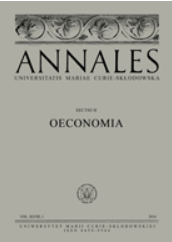Energy Security of Polish Consumers in 2004–2021
Energy Security of Polish Consumers in 2004–2021
Author(s): Krystyna Gomółka, Piotr KasprzakSubject(s): Economy, Micro-Economics, Energy and Environmental Studies
Published by: Wydawnictwo Naukowe Uniwersytetu Marii Curie-Sklodowskiej
Keywords: economic security; Poland; EU; household expenses; salaries; taxation
Summary/Abstract: Theoretical background: Energy security is one of the most important components of economic security. It is influenced not only by access to energy sources and the economic situation of the state and the individual consumer. The authors adopted the definition of energy security of an individual consumer as included in the UN report. It states that the energy security of an individual consumer is guaranteed when the average consumer has access to energy at all times, in various forms, in sufficient quantity and at a reasonable price, with the simultaneous development of support mechanisms for socially and economically sensitive consumers, and after implementation of independent mechanisms for resolving disputes with the energy company, which eliminate or at least alleviate the economic advantage of the enterprises.Purpose of the article: The main aim of the paper is to present the impact of macroeconomic indicators of the Polish economy on the energy security of Polish consumers with a minimum and average monthly income. Detailed objectives include determining the possibility of purchasing by consumers with such income, diesel oil, Pb95 gasoline, LPG, electricity, heat and present changes in the energy security of individual consumers in the analyzed period (i.e. 2004–2021).Methods: The study covered Poland, country which joined the European Union in 2004. The period of the analysis described the years from 2004 to 2021. The source of the collected information was a review of the literature on the subject and statistical data. Descriptive, tabular and graphical methods, constant dynamic indicators were used for the analysis and presentation of the results.Main findings: The last two decades of the 21st century have brought Poland a number of positive socio-economic changes. The Polish economy noted that inflation remained at the level of National Bank of Poland’s expectations, increased trade, a marked decline in unemployment and rising wages, and thus a general increase in the quality of life as well as energy security of the individual consumer. The authors assumed that in the years of 2004–2021 the consumer had good access to energy, heat and other fuels. The supplies of energy resources were ensured by long-term contracts, including the Yamal contract, and the demand for heating coal was satisfied with the raw material largely mined in Poland. Heat, mainly in large clusters of people, was generated by coal-fired power plants. This raw material was also used by power plants. For heating their houses, individual consumers – mainly in the countryside – used gas or oil.
Journal: Annales Universitatis Mariae Curie-Skłodowska, Sectio H Oeconomia
- Issue Year: LVI/2022
- Issue No: 2
- Page Range: 21-39
- Page Count: 19
- Language: English

